The Addiction (1995)
Directed by: Abel Ferrara
Written by: Nicholas St John
Starring: Annabella Sciorra, Christopher Walken, Edie Falco, Lili Taylor
USA
AVAILABLE FROM ARROW VIDEO
RUNNING TIME: 82 mins
REVIEWED BY: Dr Lenera, Official HCF Critic
Kathleen Conklin, a young philosophy student at New York University, is attacked by a woman called Casanova who bites her neck and drinks her blood. Despite being discharged from the infirmary, Kathleen begins to feel very ill, vomits blood, covers her mirrors in her apartment, wears sunglasses to class to protect her eyes from the sun, and doesn’t want to eat. Developing a craving for blood, she uses a syringe to extract blood from the arm of a sleeping homeless man, but it doesn’t help. What she actually needs to do is exactly what Casanova did to her, and first on the list is her advising professor Black….
Hailing from the artier side of movie vampiredom, a surprisingly large group containing films as diverse as Nosferatu The Vampyre and Only Lovers Left Alive, The Addiction is one odd movie and, while I can recall many critics praising it highly when it came out, it’s likely to puzzle some viewers who don’t have much of an idea of what they’re going to get or who expect fang thrills of a more typical kind. My viewing of the film the night before last [it’s really one of those films you’ve got to watch very late, preferably after midnight, to experience its unique effect] was my first despite having a liking for some of director Abel Ferrera’s [Bad Lieutenant, King Of New York, Driller Killer] other work. This is one I’d never gotten around to seeing. Even I was sometimes bewildered by the bizarre mixture of vampirism treated as a metaphor for drug addiction, Catholic guilt, the spouting of philosophy from the likes of Nietzche and Descartes, gangsta rap, and actual footage of 20th century atrocities, all shot in black and white. Yet somehow it all fits together, even if perhaps it shouldn’t, and the thing has a really haunting effect that will probably stay with you even if you feel that you haven’t totally digested what Ferrera and his usual screenwriter Nicholas St. John are trying to say. You could say that this is a film which requires you to wear your thinking cap, but I wonder if it’s better to just let it all wash over you because you’ll sure be pondering it for days afterwards anyhow.
Sometimes when reviewing a film I’m unable to find much in the way of production info, but I’m sure that I’ll find enough things to say about this particular film to make up for this. The Addiction opens with footage from the Me Lai massacre during the Vietman war, after which Kathleen says to her friend Jean that it’s wrong that only one person was ever put on trial for the atrocity, a comment that sets out what seems to me to be one of the major themes of the film – responsibility and choice. Then we get a pretty scary scene, rather similar to one in Ferrera’s Ms. 45, where Casanova appears and nonchalantly begins to follow her, only catching up with her because Kathleen has to stop at the corner to cross the road – before grabbing her by the arm, bashing her into a wall, dragging her down the stairs in to a dark alley, and then staring her down. The monochrome photography is simply outstanding here in helping to create a frightening mood, with the only light seeping through the holes of some grates. “Look at me and tell me to go away,” Casanova orders, “Don’t ask, tell me!” Kathleen has a chance to stop anything really bad happening to her, but is so scared that all she can do is whimper “please”. Fererra and St. John seem to be telling us that drug addicts, as pitiful as they may become, have the choice not to begin taking drugs in the first place. Eventually Casanova whacks Kathleen in the face and bites her neck, an act shot like a lesbian act, though in fact there’s nothing very sexy about vampirism in this movie. Nor is at all depicted as something cool. ”Want to know what’s going to happen? Just wait and see” Casanova taunts.
Kathleen soon begins to experience some of the usual symptoms, though much conventional vampire lore is thrown out the window – don’t look for stakes through the heart or warding off with crosses, for example. Kathleen’s hunger for blood is not satiated by using a syringe on a sleeping homeless person’s arm, so she has to do the business the normal way. First up is professor Black, who thinks his luck’s in when Kathleen coerces him into her apartment. Kathleen tries to fight her hunger, Lili Taylor gut-wrenchingly convincing in these scenes, but is overcome by her urges. Christopher Walken briefly turns up as – well – his character’s name is Peina but he’s basically playing Christopher Walken as usual – to steer Kathleen in the right direction with some of those wonderfully eccentric Christopher Walken speech patterns that make his movie appearances such a joy. Even he gets to quote somebody, theologian R. C. Sproul, and the way most of the characters in this film constantly repeat philosophical and theological statements does create a great deal of food for thought but for me sometimes weakens the raw, gritty nature that Ferrera was aiming for because most people, even philosophy students, don’t go on and on like that. Nonetheless, there’s some pointed lines about addiction which ring very true, such as the very sad: “There is a dual nature to the addiction. It satisfies the hunger, which evil engenders, but it also dulls our perceptions so we are helped to forget how ill we really are. We drink to escape the fact we’re alcoholics. Existence is the search for relief from our habit, and our habit is the only relief we can find”.
Ferrera and St. John’s view of human evil and how it controls us is certainly one to think about. We are not sinners because we sin, we sin because we are sinners. Kathleen eventually learns to accept her existence and free herself of guilt – though in the end she’s still committing evil no matter what, proving that she’s not that different from, say, the Germans who executed loads of Jews during World War 2. While there’s certainly a fair amount of blood resulting from her actions, the biting is generally not shown in detail, something that makes a full-on vampire massacre all the more shocking. And then there’s a truly strange ending which will no doubt confuse many – it sure confused me. I think I eventually got it, but your interpretation will probably be very different from mine especially if you’re of a religious mindset. Something anybody reading this who has seen the film will agree with me is how well Ferrera evokes the underbelly of New York, proving once again that he should probably be considered one of the great New York filmmakers, even if he likes to take us to areas Woody Allen would probably prefer to pretend don’t exist. If you think about it, vampirism as portrayed in this film is probably more likely to fester in this urban hell than in the wilds of Transylvania. For a start, it may not even be noticed much.
The use of aggressive rap music may not be music to everyone’s ears but does evoke the environment very well. The soundtrack throughout is eclectic and unusual, score composer Joe Delia often just providing edgy ambient-style backing which is very unsettling, more sound effect than scoring, and of a kind which is quite frequent today but really wasn’t the done thing back in 1995. Ken Kelsch’s cinematography is really something to behold, the camera often gliding around gracefully, black often covering parts of bodies or faces in the greatest film noir fashion. Often scenes just play out in long takes, but a simple taxi ride is turned into a mini masterpiece of composition, the camera looking in through the backseat window as reflections of things that we see in the background then pass by her face in the foreground as reflections. There’s no doubt that Ferrera took great care with nearly every aspect of this particular film. And Lili Taylor’s performance, which I wasn’t too hot on in her first few scenes, hits all the right notes during her character’s strange but really rather relatable journey. After all, many of us probably know somebody like her. One thing she shows especially well is the liberation of freedom of guilt yet still having a certain need of that feeling, such as in the scene when she says: “I am rotting inside but I am not dying” by pulling out a molar. And her narration is perfectly pitched even if sometimes it’s not entirely clear what she means, at least on a first viewing. In truth, it was a very hard role to properly nail and I can’t think of many other actresses who could have done better.
I’ll be honest here – I wasn’t entirely sure if I liked The Addiction that much at first even though I admired its style and what it was doing, and even as a I type now I still think that it could have done with a little less philosophy. But I have certainly come to the realisation that it’s one of the most outstanding vampire films of the 90’s and just shows you what you can do with an idea that’s basically quite simple. And in a way it’s also one of the most frightening, because it’s really about so many of us. It’s so easy to get addicted to – well, anything. And not all of us have the strength to tell it to go away in the first place.
Wow, wow, wow! That’s all I really need to say about the picture quality of this release, it’s simply phenomenal. Supposedly this is the first time The Addiction has been released in its original aspect ratio too.
Arrow have put together some new special features here, and first up is an audio commentary with Ferrera himself, ‘moderated’ by Brad Stevens who’s written a book about him, though Stevens says very little, perhaps unsurprisingly as Ferrera dismisses his first question about there being extras or actors in the background with: “There are no f***** extras, what you think I’m directing these people? Brad, don’t start with these crazy questions”. Despite often leaving gaps, something he apologises for twice because he hasn’t seen the film in ages, Ferrera is just such fun to listen to, commenting on the film scene by scene if not going much into production, and often going off on tangents, starting but not finishing sentences, constantly saying “bro” and “dog”, and saying some things that are just plain odd like Annabelle Sciorra being “pure evil”, then apologising and saying “we love you Annabelle“. He goes a bit into theme, praises things a lot but doesn’t like the way the film flashes back to the beginning [“this f****** crap”, as he calls it”], and seems to say that the needle scene was done for real. Unmissable!
Talking With The Vampires, running 30 minutes and directed by Ferrera himself, isn’t your usual ‘making of’ documentary. Taylor, Walken, Delia are interviewed and Kelsch and Ferrera virtually interview themselves, but it’s all very loose and unstructured, with folk tending to veer off the main subject matter at times, though Taylor and Ferrera both mentioning that they were addicts [alcohol and I guess heroin respectively] certainly added to the authentic feel of the film. Delia plays his main theme on the piano and admits it was cribbed from Bach. Maybe not a huge amount of info, but fascinating anyway, and after hearing the commentary you’ll probably be used to Ferrera’s foul mouth and quirky manner by now. The 16 minute interview with just Ferrera looks more at the actual film and the man mentions his own drug addiction again, then we get Stevens’s 8 minute appraisal, especially noting the similarities to Ms. 45, and saying that the screenplay and direction seem to be battling, and that the film is actually criticising the philosophy being spouted. And finally there’s eight minutes from 2005 of Ferrera being Ferrera in the editing suite along with a bottle of wine and a cat.
A rather unique vampire movie in an outstanding restoration and some interesting extras which have the director all over them: the Doc says that Arrow’s Blu-ray of The Addiction is a must-buy!
DIRECTOR-APPROVED SPECIAL EDITION CONTENTS
*New restoration from a 4K scan of the original camera negative by Arrow Films, approved by director Abel Ferrara and director of photography Ken Kelsch
*High Definition (1080p) Blu-ray presentation
*Restored 5.1 audio
*Optional English subtitles for the deaf and hard of hearing
*Audio commentary by Abel Ferrara, moderated by critic and biographer Brad Stevens
*Talking with the Vampires (2018) A new documentary about the film made by Ferrara especially for this release, featuring actors Christopher Walken and Lili Taylor, composer Joe Delia, Ken Kelsch, and Ferrara himself
*New interview with Abel Ferrara
*New interview with Brad Stevens
*Abel Ferrara Edits The Addiction, an archival piece from the time of production
*Original trailer
*Reversible sleeve featuring original and newly commissioned artwork by Peter Strain
*FIRST PRESSING ONLY: Illustrated collector’s booklet containing new writing on the film by critic Michael Ewins

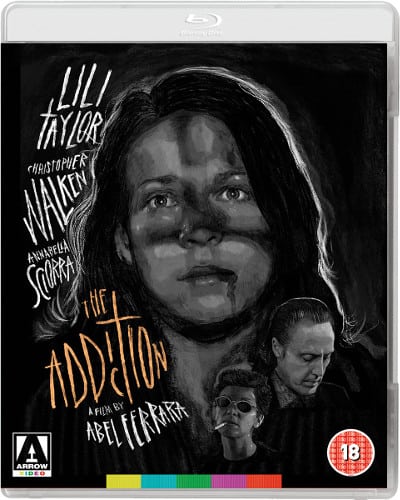
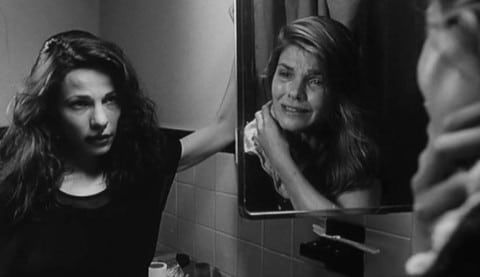
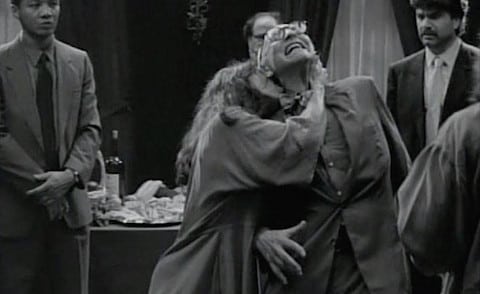



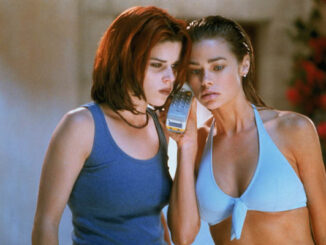
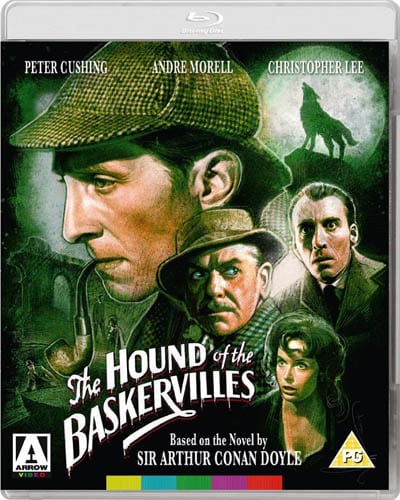
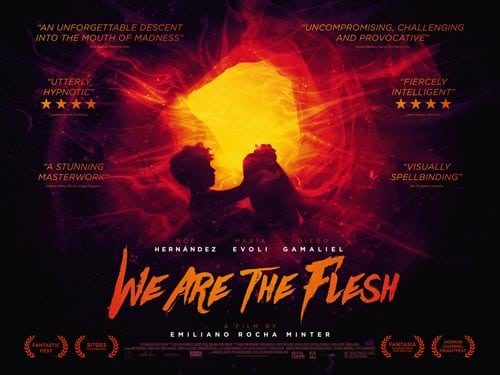
Be the first to comment